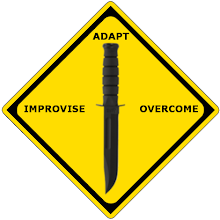Survival Situations & Natural Reactions.
We as humans have been able to survive many changes in our environment throughout the ages. This inherent and innate ability enables us to adapt both mentally and physically to a constantly changing world that keeps us alive. The average person will have some psychological reactions in a Survival Situation or SHTF Scenario.
Listed here are possible major visceral reactions and emotions you might experience within a Survival Situation or SHTF Scenario:
- FEAR. Fear, also known as "Fight or Flight Response", is one possible emotional reaction to a dangerous situation that we believe may have the potential to cause injury, illness or even death. Fear can have a positive effect, as it has the ability to heighten our senses and force us to be more cautious in situations where reckless actions could result in injury.
- ANXIETY. Anxiety is an uneasy, apprehensive feeling of impending doom we get when faced with potentially dangerous situations. A survivor will reduce his or her anxiety by keeping focused on tasks that will ensure their coming through the SHTF ordeal alive.
- ANGER & FRUSTRATION. Frustration arises when a person feels he or she is continually thwarted in his or her attempts to reach a goal. One result of frustration is anger. Possible causes could be, getting lost, breaking or losing equipment, bad weather, inhospitable terrain, or even your own physical limitations are just a few. Frustration and anger can lead to impulsive reactions, irrational behavior, bad decisions, and in some cases, an "I quit" or "I give up" attitude.
- DEPRESSION Depression is close cousin with frustration and anger when faced with the hardships of survival situations or you find that everything is FUBAR. This can lead to a destructive cycle between anger and frustration, and can continue until the person becomes worn down-physically, mentally and emotionally. At this point, he or she starts to give up, and his focus shifts from "What can I do" to "There is nothing I can do." Which if left unchecked, will ultimately lead to your untimely death.
- LONELINESS & BOREDOM Man is, by nature, a social animal and enjoys the company of others. Loneliness and boredom can be another source of depression. For one to survive, you must find ways to keep your mind productively occupied.
- GUILT Whatever circumstances have lead you to your survival situation can sometimes be dramatic or even tragic. It could have been the result of a horrific accident, or some other SHTF scenario, where there was a loss of life. Perhaps you were the sole survivor, or one of a few, survivors left. While naturally relieved to be alive, you might find yourself to be simultaneously mourning the deaths of others who were not as fortunate. If you are to survive, then it is imperative to muster the strength to carry on. Do not let feelings of guilt prevent you from living.
Labels: FUBAR, SHTF, SHTF Scenario, Survival, Survival Situations
3 Comments:
-
- JacLynn said...
January 8, 2012 at 9:32 PMI think that these emotions are important ones to think about ahead of time so that you can think about how you personally deal with stress, and figure out ways to recognize these reactions in yourself and your team/ family so as to minimize the damage they can cause. Thx for another great, thought-provoking post!- Chris Ray said...
February 10, 2012 at 4:06 PMSolid list and depending on the situation, we may go through many of these emotions. The only one I would add is hopelessness; this is maybe the most dangerous one. As long as we have a sense of hope that we’ll get through this we can keep moving forward. But if we feel that all is lost, we may just stop trying.- Bushcraft and Survival Skills said...
February 10, 2012 at 5:27 PM@Chris Ray I agree, If we find our selves at the brink of hopelessness then we must start to ask ourselves the most important of all questions "What do I have to live for?" my wife? my children? myself? each has his or her own reasons, you have to re-affirm "life" and realize that its an emotion your experiencing, you will have to dig deep to find the reasons and the strength to rise to the situation, and remember "while I still breath there is still hope".
Subscribe to:
Post Comments (Atom)


 Subscribe
Subscribe